|
I've a real soft spot for unforced cinematic storytelling. Take the opening sequence of Fukada Kôji's Harmonium, which consists of nothing more than a family eating breakfast, yet in the course of this everyday scene we learn some crucial facts about two of the lead characters. Before tucking into their meal, mother Akie (Tsutsui Mariko) and young daughter Hotaru (Shinokawa Momone) clasp their hands together in prayer to offer thanks for the food, a specifically Christian gesture in a country where Buddhism and Shintoism are the dominant religions. Not only does husband Toshio (Furutachi Kanji) not join them in their ritual, he's already well into his meal by the time his wife and daughter sit down for theirs. And while Hotaru and Akie cheerfully converse, Toshio pays them no attention and remains silently focussed on his newspaper as he eats. When Akie does address her husband, he fails to respond and instead finishes his meal, gets up from the table and changes into his work clothes. There's nothing hostile about his actions and neither Akie nor Hotaru appear remotely offended by his apparent detachment. This is clearly this particular family's current status quo. When Hotaru leaves for school, she exits through a workshop in which her father is now welding and bids him a cheery goodbye, to which he mutters a distracted response. When Akie does likewise, he simply carries on with his work. We can surmise from all this that Akie is a devout Christian and has elected to raise her daughter in the faith, and that Toshio has no religious beliefs and probably puts up with his wife's convictions for the sake on an easy life. It also seems likely that his relationship with Akie has settled into the rut of routine in which they both fulfil their roles in a marriage where love has long since been downgraded to tolerant acceptance. Crucially, each of these subtly defined character traits will later prove highly relevant to the story.
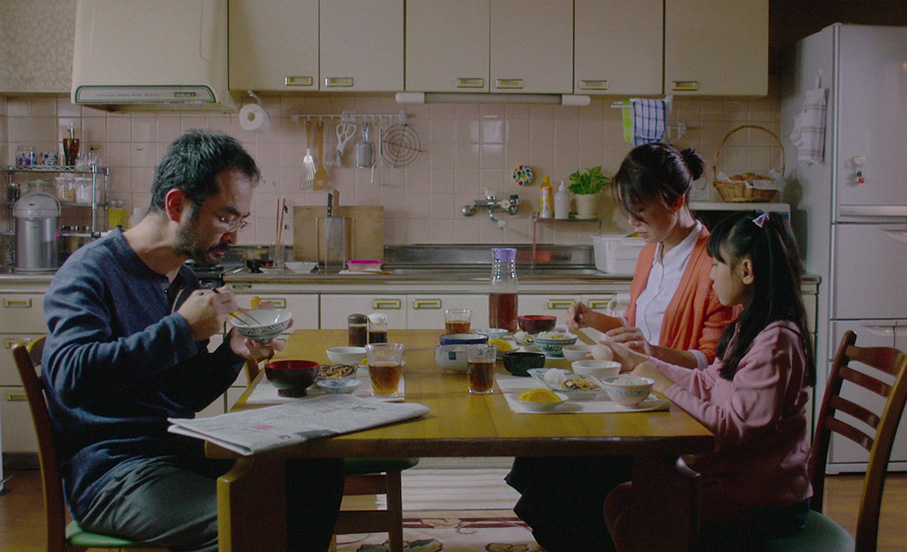
The expected disruption to this equilibrium comes just a few seconds later, when a polite and cleanly dressed man named Yasaka (Asano Tadanobu) turns up at the door of Toshio's workshop. The two men clearly know each other and it's quickly established that Yasaka has been recently released from prison. "Sorry I didn't visit you," says Toshio at one point. Rarely a good sign. Yasaka needs a favour and by the time Akie comes home, Toshio has given him a job in his workshop. Akie is more than a little uncertain about this move, but is even more startled when Toshio calmly moves Yasaka into their spare room. "It's just for three weeks," he calmly informs her, as if he does this sort of thing all the time. At first, Akie finds Yasaka's presence discomforting, but when he starts helping Hotaru with her harmonium practice, Akie finds herself gradually warming to this stranger.
I don't know about you, but right from the moment Toshio invites Yasaka into his home I was shifting in my seat. In movies at least, mysterious outsiders who worm their way into a stable family unit are rarely good news, and it's usually only a matter of time before the family members have their lives turned upside-down by their visitor's presence. If this sounds a little cynical, then check out Dominik Moll's Harry, He's Here to Help [Harry, un ami qui vous veut du bien] and see what that does for your benefit of the doubt. And there's something strangely off about Yasaka from the start, in the spotless cleanliness of the white overalls and shirts that he buttons up to the neck, and in the way that he walks with his arms and flattened hands stiffly by his side, like an ever-smiling automaton just waiting for the right trigger to activate a secret malevolence mode. Even the way he holds a fishing rod or lies down with the family for a group selfie whilst joining them on an outing feels oddly mechanical.
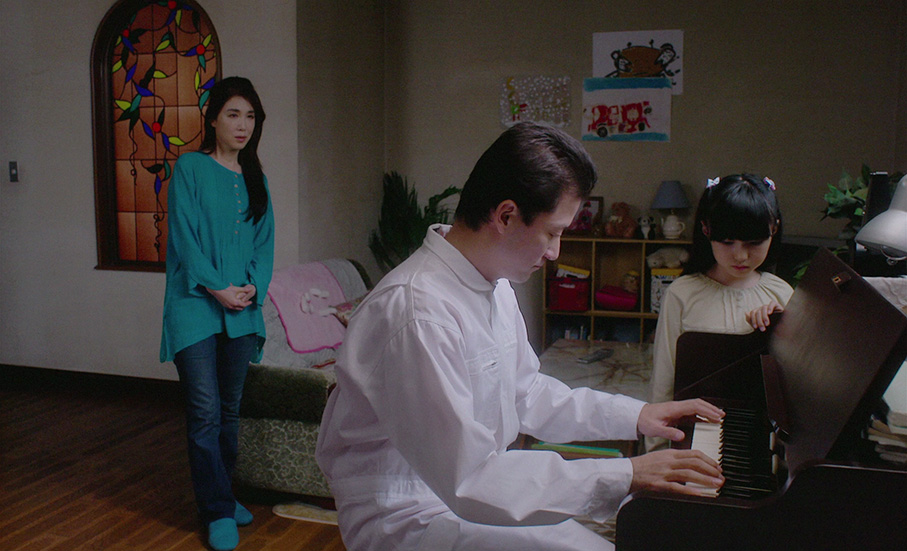
From here on in it's a case of waiting to see what Yasaka will do, but while this journey takes a couple of inevitable turns – that he takes a more intimate interest in the frustrated Akie should surprise no-one – it also delivers its share of surprises. The most intriguing is the captivating sequence in which Yasaka reveals to Akie that he was imprisoned for murder, the first of three occasions where characters unexpectedly confess a secret about themselves to Akie. Instead of recoiling, however, Akie comes to the suspect conclusion that God must really love the now apparently repentant Yasaka, and as a result becomes even more fascinated by him. Lurking in the background, meanwhile, is the lingering uncertainty over just what Yasaka appears to have on Toshio, information we're eventually clued into during a family picnic, when Yasaka momentarily drops his façade and directly confronts Toshio over past events that Akie is clearly unaware of.
The trajectory the story will now take would seem clear, but at the halfway mark something happens, something bad and unexpected that it would be unfair of me to elaborate on here, which in turn makes it difficult to discuss the direction the film takes in its second half. What I can reveal is that the story then moves forward eight years and focuses squarely on how the characters are individually coping with the consequences of the action I've chosen not to reveal. A new individual enters the story at this point, one with seemingly no connection to previous events but whose significance I found a tad too easy to predict, but he does prove instrumental to the direction the narrative takes from this point on.
It's probably worth knowing up front that Harmonium is a seriously downbeat film. With the arrival of Yasaka, its casual portrait of a family in a state of quiet dysfunction quickly takes on a subtly sinister air, and in the second half it sinks slowly but steadily into an abyss from which there seems to be no salvation, emphasised by an ambiguous but still emotionally punishing ending. Coupled with director Fukada Kôji's deliberate pacing, this may well prove heavy going for a portion of the film's potential audience, but for those up to the challenge, this is a grimly compelling tale of lives disrupted and ultimately devastated by an almost karmic cycle of fate, a work whose religious undertones and symbolism are neither overt nor in any way preachy – at one point even a change of clothing is clearly designed to be read primarily in theological terms.
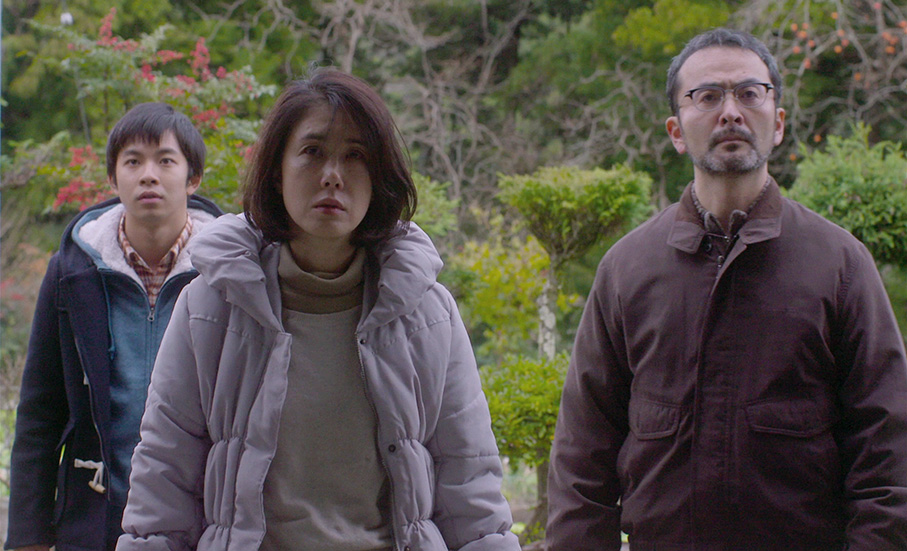
The performances are first rate, with popular favourite Asano Tadanobu most effectively unsettling as the polite and well-dressed Yasaka, and Fukada regular Furutachi Kanji is persuasively insular as Toshio, but both are quietly outshone by Tsutsui Mariko as Akie, particularly in the second half where the emotional shifts she is required to undergo are often painfully convincing. The mood is set by cinematographer Negishi Ken'ichi's naturalistic lighting and locked-down camerawork, which switches to handheld during sequences of emotional uncertainty or stress, sometimes with such subtlety that you'll barely detect it and at one point jarringly so in an expressionistic reflection of the extreme distress of the character being observed. A sobering and sometimes discomforting experience it may be, but Harmonium still exerts a consistent grip, and delivers both as a troubling psychological drama and an incisive portrait of the breakdown of the family unit, one whose characters and plot development are rich in metaphorical readings. Just don't expect to emerge with the sunniest of smiles on your face.
A pin-sharp 1080p 1.66:1 transfer that's as spotless as Yasaka's white shirts and boasts a sublime contrast range and attractively naturalistic colour rendition, both of which are at their very best on daylight exteriors, though picture detail is always clear even in darker scenes. Black levels are consistently strong throughout with no hint of black crush. A lovely transfer.
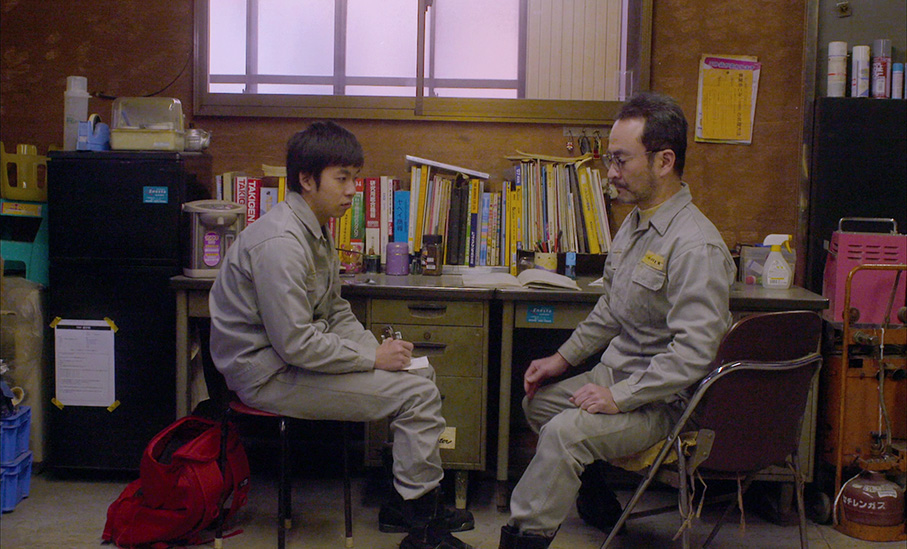
There are two choices for the Japanese language soundtrack, Linear PCM 2.0 stereo and DTS-HD Master Audio 5.1 surround. Both are clearly recorded and mixed with a strong dynamic range, but while the 5.1 track makes only minimal use of the surrounds (Onogawa Hiroyuki's score is the main beneficiary here), it has a richness and fullness that clearly outstrips the stereo track and is definitely the one to go for.
Optional English subtitles kick in by default.
Interview with Actor Furutachi Kanji (29:06)
Conducted in English with slightly tinny sound and distractingly underscored by Hotaru's harmonium playing from the film's soundtrack, this is still a worthwhile interview with actor Furutachi Kanji, whose role as Toshio in the film is his fourth collaboration with director Fukada Kôji. He recalls how he was first drawn to theatre and eventually film, and talks about developing the character of Toshio, his favourite scenes to shoot and the one he found the hardest (this one surprised me), the film's Un Certain Regard Jury Prizewin at Cannes, and more.
Interview with Director Fukada Kôji (25:50)
Conducted in Japanese with English subtitles and also backed by harmonium music, this is a busy interview with the talkative Fukada, who reveals that the film began life as a short synopsis ten years earlier and that his starting point was to look at the incidents that destroy daily life. Even if I hadn't seen the film I'd be intrigued by that. He explains how the overseas title of Harmonium was chosen and that it came about because the original Japanese title, Fuchi ni tatsu, has no equivalent in English that makes any sense, and offers "Standing on the cliff edge and looking out over the darkness in the human mind" as the closest equivalent. He also talks about the casting, working with cinematographer Negishi Ken'ichi, the importance of locations to the feel of the film, his favourite filmmakers, and a good deal more.
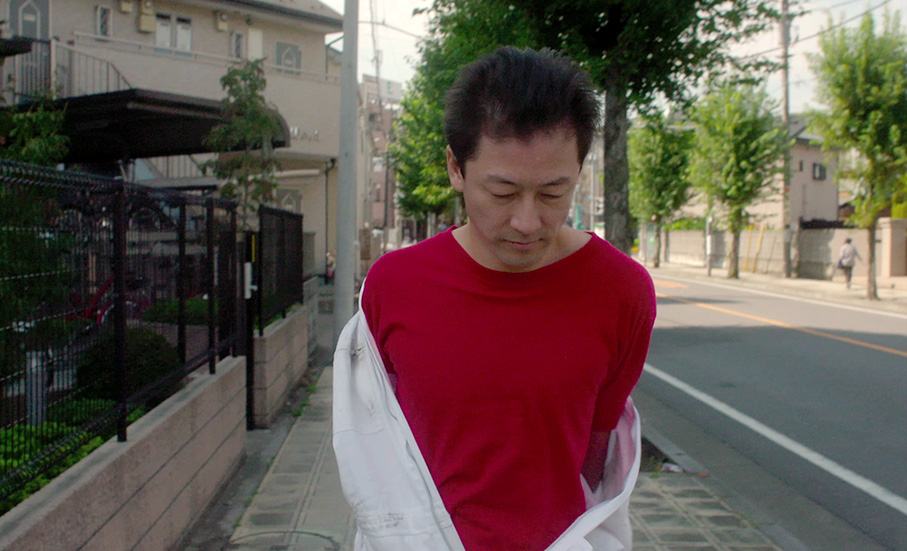
Theatrical Trailer (1:44)
A slickly assembled and seductive trailer whose minor potential spoilers are seen too briefly here to count as such.
Also included with the release disc is a Booklet featuring an appreciation of the film by Jason Wood, a director's statement and an interview with Fukada Kôji, but this was not available for review.
My first viewing of Harmonium was not ideal, catching me at a low ebb in a time in my life that seems liberally peppered with them, and I did start to feel I was being pulled into the darkness along with the characters. But the film's hold is considerable, and a second viewing revealed just how multi-layered its narrative and character arcs are, and how subtle and effective its use of symbolism is. A dark and downbeat drama, but a supremely well-handled one, Harmonium is well served here by an excellent HD transfer and is backed by a couple of very worthwhile extras. Recommended.
The Japanese convention of surname first has been used for all Japanese names in this review.
|